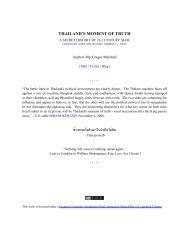THAILAND'S MOMENT OF TRUTH - ZENJOURNALIST
THAILAND'S MOMENT OF TRUTH - ZENJOURNALIST
THAILAND'S MOMENT OF TRUTH - ZENJOURNALIST
You also want an ePaper? Increase the reach of your titles
YUMPU automatically turns print PDFs into web optimized ePapers that Google loves.
The possibility that Bhumibol shot his brother - probably by accident - was regarded as the most likely<br />
scenario by many senior Thai officials and foreign diplomats at the time. The common view was that the<br />
truth had then been suppressed to prevent Thailand sinking deeper into turmoil. Stevenson writes that<br />
Mountbatten sent an ill-informed letter to King George VI that said “King Bhumibol shot his brother<br />
to obtain the crown”; as a result, the British king refused to receive Bhumibol, declaring “Buckingham<br />
Palace does not host murderers.” It is also widely reported that during the early years of Rama IX’s reign,<br />
on several occasions the generals locked in a power struggle with the throne used the threat of publicly<br />
revealing evidence - either real or fabricated - that the king had killed his brother, in an effort to force<br />
Bhumibol to comply with their wishes. But if there was ever any genuine evidence that Bhumibol was<br />
responsible, it has never emerged.<br />
In August 1946, amid widespread concerns that Bhumibol's life was also in danger, the young king<br />
left Thailand to return to Lausanne. He was away from his homeland for almost four years. During<br />
his absence, the generals running the country tried to strip the throne of even more of its influence and<br />
establish themselves as Thailand's unquestioned rulers, while a coterie of princes fought to preserve the<br />
powers of the palace. Bhumibol went back to his studies in Switzerland.<br />
The axle around which this whole cosmic wheel spun, meanwhile, was ensconced in Lausanne,<br />
Switzerland, maybe pondering his schizophrenic life. One persona was a European university<br />
student caught up in the postwar reconstruction zeitgeist. The other, less familiar identity was the<br />
sacral dhammaraja king of Thailand, turgid, conservative, confined by an entourage of elderly<br />
men who emphasized only the old...<br />
His personalized studies left him much free time to travel, play his music, and socialize. He<br />
frequently drove himself to Paris to go shopping and pass nights in smoky jazz clubs. He helped<br />
his car-racing uncle Prince Birabongs in the pits at the Grand Prix des Nations in Geneva, and<br />
in August 1948, during a motor tour of northern Europe, he watched Birabongs take first place<br />
at Zandvoort. Bhumibol put even more time into his photography and music, fancying a second<br />
career as a jazzman. [Handley, The King Never Smiles]<br />
Rama IX was also the most eligible Thai bachelor in the world. He was encouraged to meet several blueblooded<br />
young Thai women, and one of them charmed him above all others - Sirikit Kitiyakatra, daughter<br />
of Prince Nakkhat, Thai ambassador to Paris. In an interview for the 1980 BBC documentary Soul of a<br />
Nation, Sirikit recalled their first meeting in Paris:<br />
It was hate at first sight... because he said he would arrive at 4 o'clock in the afternoon. He arrived<br />
at 7 o'clock, kept me standing there, practicing curtsey, and curtsey.<br />
But in October 1948, Bhumibol crashed his car into the back of a truck outside Lausanne. Sirikit helped<br />
care for him during his recovery in Switzerland. She told the BBC:<br />
It was love... I didn't know that he loved me, because at that time I was only 15 years old and<br />
planned to be a concert pianist. He was gravely ill in the hospital... He produced my picture out




